Introduction
The Hock Principle Quote sparks curiosity among those exploring leadership and innovation. This principle, rooted in adaptability and balance, is a cornerstone of modern leadership discussions. Dee Hock, the visionary founder of Visa, shaped this philosophy to emphasize the harmony between chaos and order.
The Hock Principle Quote serves as a guide, pushing leaders to rethink traditional organizational models and embrace flexibility.
At its core, this principle aligns with the Dee Hock Leadership Principles, where leadership transcends hierarchy. Hock’s ideas challenge conventional business structures, urging companies to adopt a Chaordic Leadership Definition—a model blending chaos with order. In practice, this balance is seen in strategies like the Hock Principle in Business, which prioritizes innovation and decentralized decision-making.
The philosophy also inspires the Visa Founder Management Philosophy, showing how adaptability can drive success. It resonates with concepts like Hock Principle Strategic Management and the pursuit of Hock Principle and Organizational Success. Real-world examples, like Chaordic Organization Examples, illustrate its potential impact.
Hock’s ideas are not just theoretical; they are practical tools. His Leadership Lessons from Dee Hock and Dee Hock Management Quotes offer insights that resonate deeply with aspiring leaders. This introduction sets the stage for exploring how the Hock Principle Quote continues to shape innovative leadership and organizational transformation.
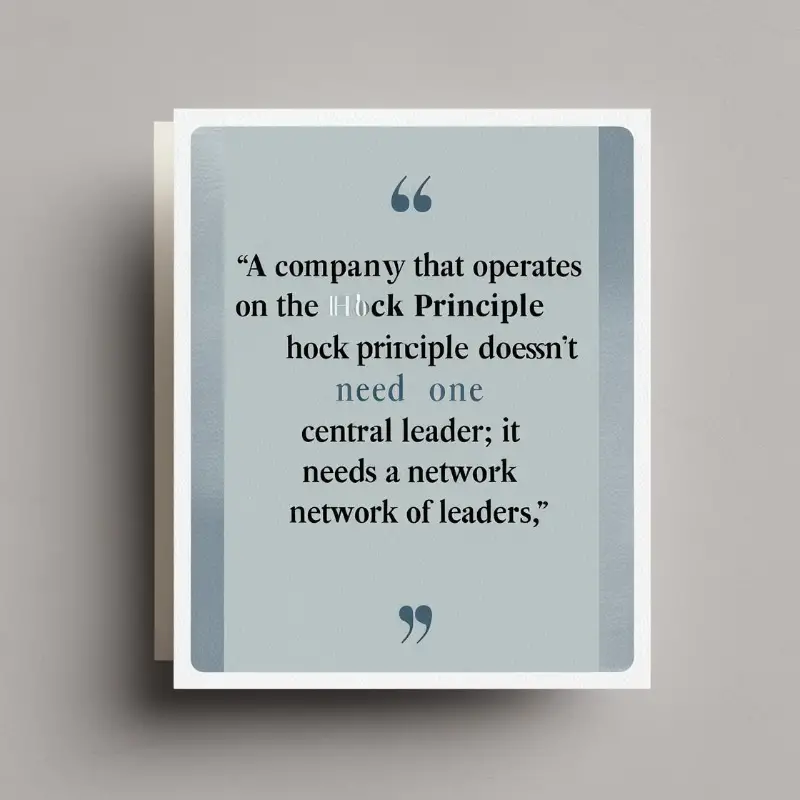
Understanding the Hock Principle: A Key to Leadership Success
- “The Hock Principle is not just about organizing; it’s about creating an environment where individuals can thrive while contributing to the larger system.”
The Hock Principle emphasizes decentralized leadership that empowers individuals, a core aspect of Dee Hock Leadership Principles. - “Leadership through the Hock Principle is about embracing chaos to foster creativity and innovation.”
This aligns with the Chaordic Leadership Definition, where structured chaos leads to better problem-solving and adaptability in leadership. - “A company thriving on the Hock Principle doesn’t just follow orders; it builds trust and collaborative efforts among its members.”
This reflects the philosophy behind Hock Principle in Business, where trust and autonomy are key to success. - “The strength of the Hock Principle lies in its ability to combine structure and flexibility, leading to agile and responsive leadership.”
A hallmark of Visa Founder Management Philosophy, Hock’s approach supports adaptable leadership in fast-changing environments. - “Hock Principle Strategic Management focuses on long-term vision and decentralized decision-making to empower employees.”
The strategic component of the Hock Principle plays a vital role in shaping Hock Principle and Organizational Success, allowing organizations to pivot when necessary. - “True leadership is not about control; it’s about enabling others to step up and take responsibility.”
This resonates with Dee Hock Leadership Principles, which prioritize empowering individuals within an organization. - “The Chaordic Organization encourages a blend of order and chaos, where innovation is nurtured through adaptability.”
This idea connects closely with the Chaordic Organization Examples, illustrating how organizations apply these principles in practice. - “Hock Principle and Organizational Success are intertwined—one cannot exist without the other in a thriving business.”
For an organization to succeed long-term, it must embrace decentralized leadership, a core idea in Hock Principle in Business. - “The Hock Principle represents a shift away from traditional hierarchical management to a more fluid and organic approach.”
This reflects the innovative approach outlined in Visa Founder Management Philosophy, focusing on collaboration over control. - “Leadership Lessons from Dee Hock emphasize the importance of valuing people over systems to create a sustainable business model.”
Hock’s insights reveal how prioritizing human capital leads to stronger, more resilient companies, a lesson in Dee Hock Management Quotes. - “The beauty of the Hock Principle lies in its simplicity: it enables companies to adapt, thrive, and remain competitive in changing markets.”
This simplicity is the backbone of Hock Principle Strategic Management, a concept essential for both short-term and long-term success. - “True leaders don’t create followers; they create more leaders by empowering those around them.”
A core idea within Dee Hock Leadership Principles, where leadership is about fostering growth in others. - “Hock’s idea of decentralized decision-making fosters autonomy while aligning individuals with the company’s larger mission.”
This decentralized approach is a cornerstone of Visa Founder Management Philosophy, ensuring that employees are aligned with corporate goals. - “The Chaordic Leadership Definition challenges the conventional view of control by embracing a balance of chaos and order to drive innovation.”
This idea challenges traditional organizational structures, favoring agility and innovation through the Hock Principle in Business. - “Hock’s vision for organizations focuses on collaborative synergy rather than individual heroism.”
This collective approach is critical for Hock Principle and Organizational Success, which hinges on teamwork and mutual respect.
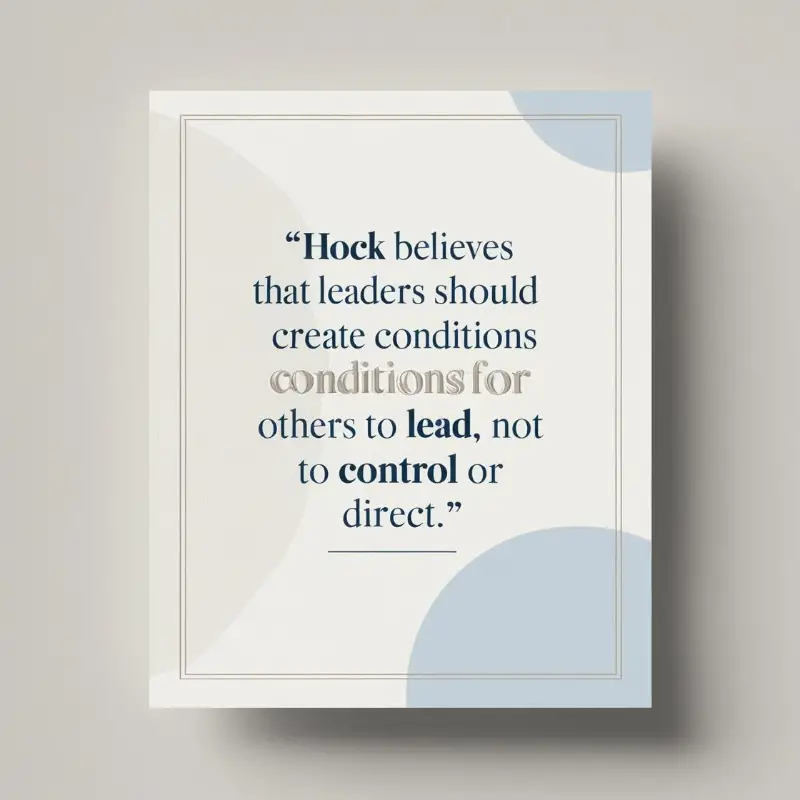
Hock Principle in Business: A New Paradigm for Organizational Growth
- “The Hock Principle encourages companies to break free from rigid hierarchies and create a more fluid, adaptive organizational structure.”
This concept aligns with Hock Principle Strategic Management, where flexibility and adaptability are key components of effective leadership. - “Through the Hock Principle, businesses can create a more egalitarian workplace, where everyone is empowered to lead.”
This idea reinforces Dee Hock Leadership Principles, which aim to distribute leadership responsibilities across the organization. - “Hock’s approach to business is about fostering relationships rather than rigid structures to promote sustainable growth.”
This philosophy is evident in the Chaordic Leadership Definition, where networks and relationships are more important than top-down control. - “A company that operates on the Hock Principle doesn’t need one central leader; it needs a network of leaders.”
This reflects Visa Founder Management Philosophy, which emphasizes shared responsibility and decentralized decision-making. - “True success in business comes not from controlling employees but from enabling them to contribute fully to the organization’s vision.”
This reflects the heart of Hock Principle and Organizational Success, focusing on creating an environment of autonomy and trust. - “The Hock Principle allows businesses to grow sustainably by tapping into the collective intelligence of their workforce.”
This idea supports Hock Principle Strategic Management, where wisdom from all corners of the business contributes to long-term growth. - “Hock’s model for business encourages collaboration rather than competition, fostering a culture of mutual benefit.”
This aligns with Chaordic Organization Examples, where companies emphasize collaboration as a driving force for innovation and success. - “The Hock Principle is not about eliminating structure but about creating a flexible structure that promotes freedom within boundaries.”
This approach is rooted in Dee Hock Leadership Principles, which maintain a balance between autonomy and organization. - “Hock believes that true leadership is not about creating followers but creating conditions where others can lead.”
This perspective on leadership is fundamental to Leadership Lessons from Dee Hock, emphasizing empowerment over control. - “A successful organization under the Hock Principle is one that embraces change and fosters adaptability at every level.”
This adaptability is essential to Hock Principle Strategic Management, where businesses respond to changing environments by empowering employees. - “To succeed in business, a company must cultivate leaders at every level, from the CEO down to the entry-level positions.”
This notion aligns with Hock Principle in Business, which aims to empower all individuals to take responsibility and lead. - “Hock’s approach to leadership is about creating a vision that inspires others to lead, not just follow.”
This idea is echoed in Leadership Lessons from Dee Hock, where visionary leadership enables others to rise to the occasion. - “Visa’s success is rooted in the Hock Principle, where individuals at every level of the company are entrusted with leadership roles.”
This aligns with the Visa Founder Management Philosophy, which stresses the importance of empowering employees across the board. - “The Hock Principle is about creating a culture of trust where every individual has the autonomy to make decisions.”
This trust is critical to Chaordic Leadership Definition, which thrives on decentralized decision-making and responsibility. - “By focusing on organizational synergy and collective goals, the Hock Principle promotes greater alignment within businesses.”
This alignment is key to Hock Principle and Organizational Success, ensuring that everyone in the organization moves toward the same goals.
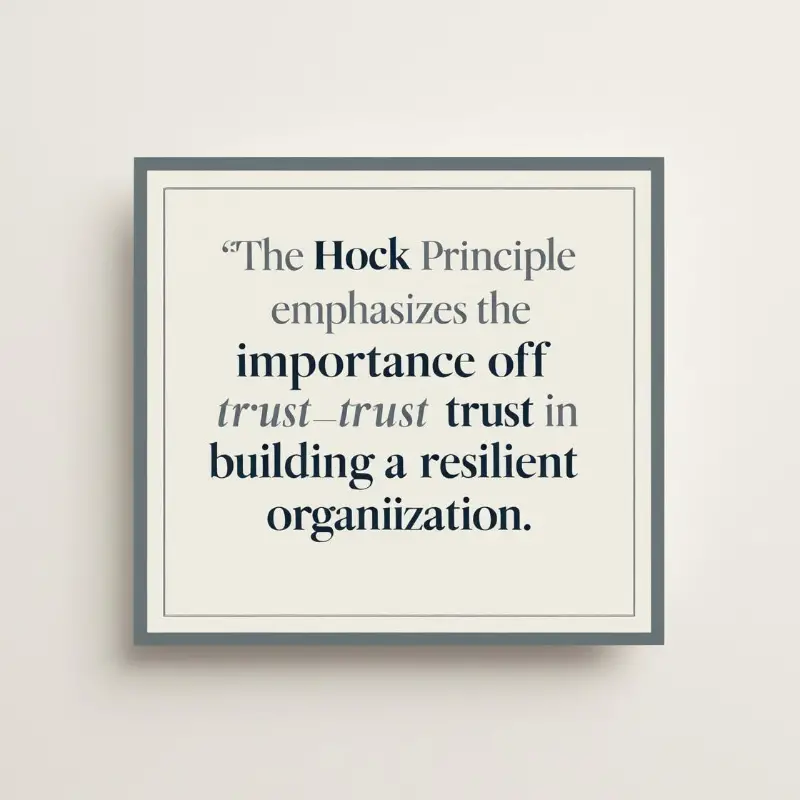
Leadership Lessons from Dee Hock: Applying the Hock Principle
- “Dee Hock’s Leadership Principles are built on the idea of creating decentralized leadership, where all individuals contribute to the company’s vision.”
This principle is central to Dee Hock Leadership Principles, emphasizing the importance of shared responsibility and empowerment. - “Hock believes that leaders should create conditions for others to lead, not to control or direct.”
This empowerment-focused leadership style aligns with Hock Principle Strategic Management, where decentralization encourages innovation. - “True leadership is about fostering relationships, not creating followers.”
This is a core belief in Dee Hock Management Quotes, where leadership is seen as a process of enabling others rather than dominating them. - “The Hock Principle teaches us that leadership is about enabling individuals to take responsibility, not about holding power over them.”
This approach is consistent with Dee Hock Leadership Principles, where autonomy and accountability are core to leadership success. - “The best leaders are those who empower others to rise to the occasion, creating a leadership environment where everyone thrives.”
This idea is central to Leadership Lessons from Dee Hock, where leadership is not about hierarchy, but about empowerment. - “Dee Hock’s legacy lies in his ability to redefine leadership by focusing on collaboration, trust, and empowerment.”
This redefined leadership is a hallmark of Visa Founder Management Philosophy, where collaboration is seen as the path to success. - “The Hock Principle shows us that leadership is not about controlling others, but about creating a vision that inspires action.”
This resonates with Chaordic Leadership Definition, where leadership is defined by the ability to create direction while allowing flexibility. - “Leadership under the Hock Principle thrives in an environment where individuals have the freedom to make decisions within a shared framework.”
This freedom within structure is a key idea in Hock Principle Strategic Management, promoting decision-making at all levels. - “Leaders who embrace the Hock Principle know that their role is to guide and support others in their leadership journey.”
This guidance-focused leadership is a core aspect of Dee Hock Leadership Principles, emphasizing mentorship over control. - “Hock’s leadership lessons remind us that true success comes from creating an environment where everyone is empowered to contribute.”
This environment of empowerment is critical to Hock Principle and Organizational Success, fostering collaboration and innovation. - “A leader’s role is to create conditions that enable others to lead, thus multiplying the impact of leadership.”
This idea of multiplicative leadership is central to Leadership Lessons from Dee Hock, where leadership is not singular but shared. - “The Hock Principle teaches that leadership is about cultivating a collective vision that guides individuals toward a common goal.”
This vision-driven leadership is a hallmark of Visa Founder Management Philosophy, where a shared purpose drives success. - “Hock’s leadership lessons emphasize the importance of flexibility, adaptability, and empowerment in creating a thriving organization.”
These lessons are at the heart of Hock Principle Strategic Management, which fosters adaptability across all levels of leadership. - “In Hock’s model, leadership is about making decisions in the best interest of the whole system, not just individual gain.”
This system-based approach aligns with Chaordic Leadership Definition, where the focus is on the collective rather than the individual. - “Leadership is about creating an environment where everyone can contribute to the company’s success, not just following orders.”
This philosophy of shared responsibility reflects Hock Principle and Organizational Success, where success is a result of collective input.
The Chaordic Organization: Implementing the Hock Principle for Business Growth
- “A Chaordic Organization thrives on the principles of the Hock Principle, where both chaos and order coexist to foster innovation.”
This balance is a defining feature of Chaordic Leadership Definition, ensuring that organizations remain flexible yet organized. - “The Hock Principle allows businesses to function in a decentralized way, where leadership is distributed and responsibility is shared.”
This decentralized approach is the foundation of Visa Founder Management Philosophy, creating a business structure where all employees lead in their own capacity. - “Chaordic Organization Examples show us that when organizations embrace flexibility, they become more resilient in the face of change.”
The adaptability seen in these examples aligns with Hock Principle Strategic Management, where flexible structures help businesses navigate challenges. - “In a Chaordic Organization, leadership is not about control but about empowering individuals to take ownership of their roles.”
This empowerment-driven approach echoes the Dee Hock Leadership Principles, which emphasize enabling employees to lead themselves. - “A Chaordic Organization creates a thriving culture where collaboration and creativity are key to success.”
This culture is part of the Hock Principle and Organizational Success, where cooperation and innovation drive business performance. - “Leadership within a Chaordic Organization is about creating environments where employees can experiment and innovate, rather than following rigid procedures.”
This aligns with Hock Principle Strategic Management, where creativity and experimentation are encouraged to solve problems. - “The strength of the Chaordic Organization lies in its ability to allow diverse leadership styles to flourish while remaining aligned to the same core principles.”
This diversity of leadership styles is central to Dee Hock Leadership Principles, which value varied perspectives and shared goals. - “Chaordic Organization Examples highlight the importance of decentralized leadership structures that enable the business to thrive in an unpredictable world.”
This decentralized approach is a key component of Hock Principle Strategic Management, making organizations agile and adaptive. - “The Hock Principle guides leaders to step back and allow others to lead, fostering an environment where everyone can contribute to organizational success.”
This shift from control to empowerment is essential to Hock Principle and Organizational Success, allowing a more dynamic and responsive business. - “In Chaordic Organizations, leadership is about nurturing a sense of shared responsibility, where everyone feels accountable to the organization’s goals.”
This sense of shared responsibility reflects Dee Hock Leadership Principles, where accountability is not confined to a select few but distributed throughout the organization. - “Leaders in Chaordic Organizations focus on creating systems that are self-organizing and self-regulating, much like the structure of the Hock Principle.”
This self-regulation and autonomy are central to the Chaordic Leadership Definition, where organizations are resilient and adaptable in any circumstance. - “The Chaordic Organization shows us that when leadership is decentralized, it fosters innovation and responsiveness to market changes.”
This decentralization is the key to Hock Principle in Business, creating an environment where leaders emerge at all levels. - “Chaordic Organization Examples demonstrate that flexibility and responsiveness are critical for businesses seeking sustainable growth.”
These examples resonate with Hock Principle and Organizational Success, showing that adaptability is crucial for long-term prosperity. - “The Hock Principle encourages organizations to embrace uncertainty as an opportunity for growth, innovation, and leadership development.”
This view of uncertainty aligns with Dee Hock Leadership Principles, where challenges are seen as opportunities for leaders to emerge at all levels. - “The Chaordic Organization is defined by its ability to foster leadership and innovation, ensuring every member has a stake in the company’s success.”
This alignment with Chaordic Leadership Definition emphasizes the importance of shared leadership in building resilient and innovative organizations.
Hock Principle and Organizational Success: Lessons from the Visa Founder
- “The Hock Principle emphasizes the importance of aligning organizational success with individual empowerment and decentralized decision-making.”
This principle is core to Hock Principle and Organizational Success, where the success of the organization is tied to the ability of individuals to lead and innovate. - “Visa’s global success can be attributed to its application of the Hock Principle, where leadership is distributed and decisions are made at every level of the organization.”
This is an embodiment of Visa Founder Management Philosophy, showcasing the importance of decentralized leadership in achieving growth. - “Organizational success in the Hock Principle is about creating a system where leadership is shared, and innovation is fostered at every level.”
This aligns with Dee Hock Leadership Principles, where leadership is not concentrated but spread across the organization to ensure adaptability. - “The Hock Principle encourages businesses to embrace the chaos that comes with growth and transformation, making them more agile and successful.”
This approach supports Chaordic Leadership Definition, where organizations accept and adapt to changing conditions, allowing for better responses to market shifts. - “In a business operating under the Hock Principle, success is built on collaboration and innovation, not hierarchy and control.”
This collaborative environment is central to Hock Principle in Business, where the focus is on collective problem-solving and shared leadership. - “Hock’s approach to organizational success involves creating an environment where each individual feels empowered to contribute to the company’s vision.”
This reflects the core of Hock Principle and Organizational Success, where every individual has a role in shaping the business’s future. - “Leadership in a business that follows the Hock Principle is about guiding employees toward shared goals, not just giving orders.”
This guidance-focused approach aligns with Dee Hock Leadership Principles, where leadership is seen as a way to direct and empower rather than control. - “The success of Visa and other companies implementing the Hock Principle proves that decentralized leadership leads to stronger, more innovative organizations.”
This observation emphasizes the relationship between Visa Founder Management Philosophy and the success of businesses applying the Hock Principle. - “Organizational success under the Hock Principle is about fostering creativity and trust, allowing each individual to take ownership of their role.”
This focus on creativity and trust is a key element of Hock Principle Strategic Management, where leaders encourage innovation and self-leadership. - “The core of the Hock Principle’s organizational success lies in its ability to align individual goals with the organization’s broader mission.”
This alignment is central to Hock Principle in Business, where decentralized leadership ensures that all levels of the organization work toward a common goal. - “Hock’s principle teaches businesses that true organizational success comes when leadership is shared, not hoarded.”
This decentralization echoes Dee Hock Leadership Principles, which emphasize empowering others to lead, resulting in more collaborative and sustainable organizations. - “Hock’s organizational philosophy encourages businesses to decentralize authority, enabling rapid decision-making and innovation at all levels.”
This is a central feature of Chaordic Leadership Definition, where decision-making is distributed to increase responsiveness and agility. - “The Hock Principle guides organizations to become more adaptive and resilient, paving the way for long-term success in a rapidly changing market.”
This adaptability is a cornerstone of Hock Principle Strategic Management, which focuses on keeping organizations responsive to market conditions. - “The key to organizational success in the Hock Principle is recognizing that leadership is a shared responsibility, not just the role of the top executives.”
This shared leadership approach underpins Hock Principle and Organizational Success, where every individual has a role in the company’s success. - “Hock’s philosophy teaches us that success is built on a foundation of trust, creativity, and distributed leadership.”
This foundation is what makes Dee Hock Leadership Principles effective, creating organizations that are capable of evolving and thriving.
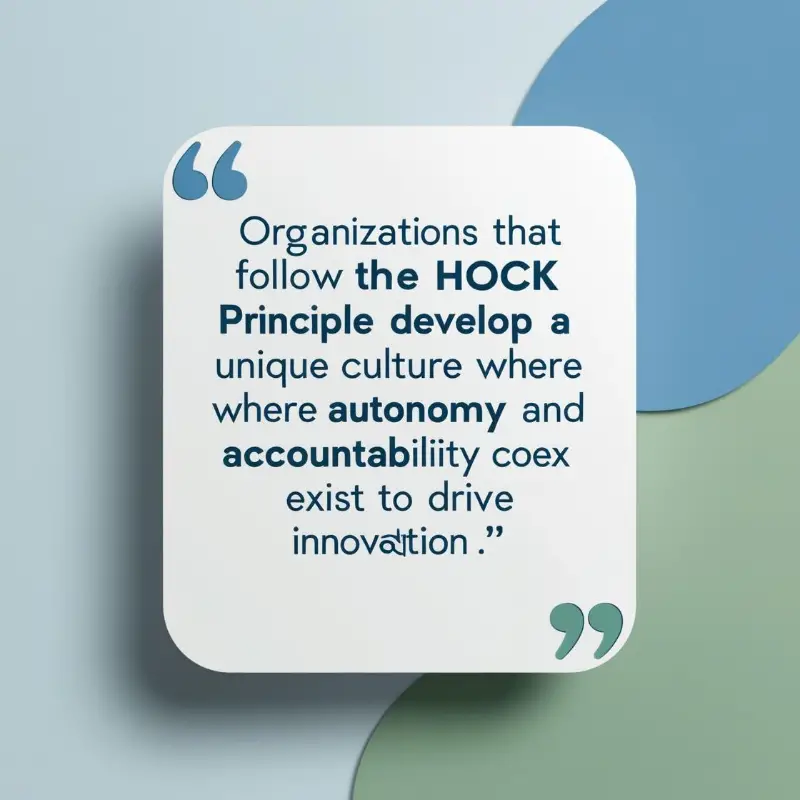
Building Stronger Businesses with the Hock Principle
- “The Hock Principle emphasizes the importance of trust in building a resilient organization.”
By following the Hock Principle Quote, businesses can foster an environment of mutual trust, which becomes the foundation of both leadership and employee relationships. - “Adopting the Hock Principle helps businesses thrive by balancing order and chaos.”
The Hock Principle Quote highlights the strength of this balance, encouraging companies to embrace uncertainty while maintaining enough structure to stay organized and efficient. - “Organizations that use the Hock Principle are built to grow and adapt, allowing leadership to emerge from any level of the business.”
This philosophy, captured by the Hock Principle Quote, highlights that leadership does not need to be centralized but should be distributed across the organization to allow for innovation and growth. - “When companies embrace the Hock Principle, they unlock new pathways for creativity and problem-solving.”
The Hock Principle Quote aligns with the idea that by creating systems that allow for decentralized decision-making, businesses become more agile and open to creative solutions. - “The strength of the Hock Principle lies in its ability to empower individuals to lead and innovate without the constraints of rigid structures.”
As echoed in the Hock Principle Quote, the power of decentralized leadership allows businesses to be more flexible, adapting to changes quickly and fostering innovation. - “True success in business comes from aligning organizational goals with the values and strengths of individuals within the company.”
The Hock Principle Quote reiterates that alignment of values and strengths allows for both individual empowerment and organizational growth. - “The Hock Principle teaches that the most effective businesses are those where leadership is spread throughout the organization.”
According to the Hock Principle Quote, decentralized leadership structures allow for quicker decision-making and better adaptability in the face of challenges. - “Through the Hock Principle, businesses learn to embrace both autonomy and collaboration as drivers of success.”
The Hock Principle Quote emphasizes that the blend of autonomy in decision-making and collaboration between departments ensures that organizations stay competitive and innovative. - “Leaders who understand the Hock Principle know that fostering a culture of trust and shared responsibility leads to greater success.”
As the Hock Principle Quote suggests, trust and shared responsibility are essential elements of a business’s culture, paving the way for sustainable growth. - “The Hock Principle shows that a business can be successful when it embraces diversity in thought and leadership.”
The Hock Principle Quote underscores how allowing for diverse leadership approaches within an organization leads to stronger problem-solving and innovation. - “When businesses adhere to the Hock Principle, they create environments where employees are empowered to take ownership of their roles.”
This empowerment, highlighted in the Hock Principle Quote, enables employees to step up as leaders and contribute to the company’s success in meaningful ways. - “The Hock Principle emphasizes that companies must be flexible and adaptable to succeed in today’s fast-paced business world.”
The Hock Principle Quote reminds us that adaptability is key to long-term success, as it allows organizations to respond to changing conditions in real time. - “Incorporating the Hock Principle into business management helps organizations become more self-sustaining and less reliant on top-down control.”
The Hock Principle Quote supports the idea that businesses which focus on self-regulation and autonomy thrive in an environment of constant change. - “The Hock Principle encourages businesses to take risks and innovate, knowing that failure is an integral part of the learning process.”
The Hock Principle Quote reflects the importance of fostering a culture that allows for calculated risk-taking, leading to greater rewards and growth opportunities. - “Leadership under the Hock Principle is not about maintaining control, but about empowering others to lead with responsibility and creativity.”
As the Hock Principle Quote demonstrates, leadership is about creating conditions that allow everyone to act as a leader within their domain, ensuring that ideas flow freely across the organization.
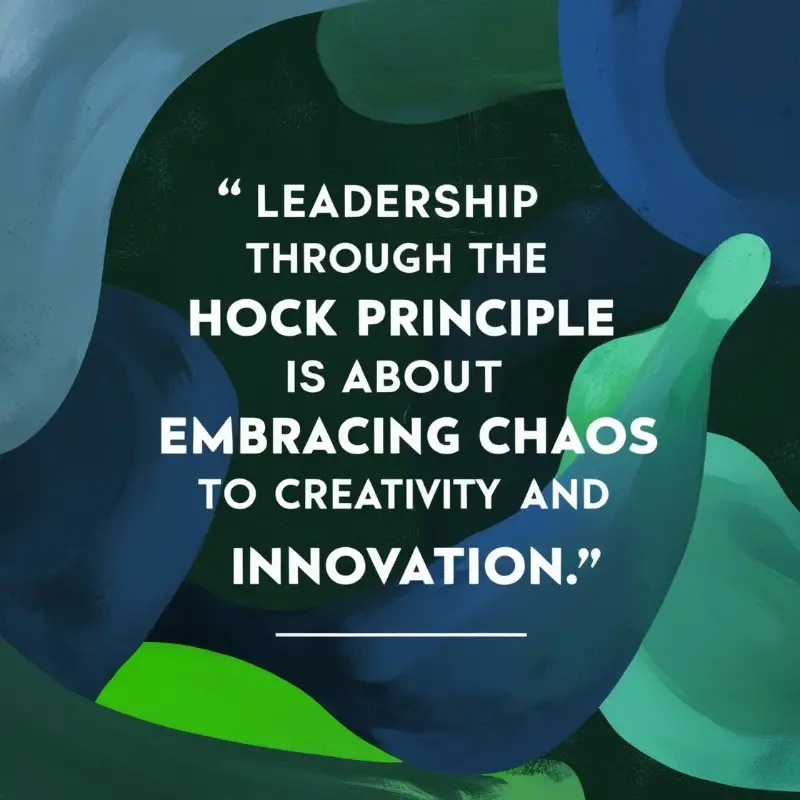
The Impact of the Hock Principle on Organizational Culture
- “The Hock Principle requires businesses to create a culture of inclusivity and collaboration, where every individual has a voice.”
The Hock Principle Quote highlights how inclusivity and collaboration lead to a culture where all voices are heard, resulting in stronger teamwork and shared goals. - “Organizations that follow the Hock Principle develop a unique culture where autonomy and accountability coexist to drive innovation.”
This balance, emphasized in the Hock Principle Quote, creates a healthy organizational culture that encourages both independence and collective responsibility. - “The Hock Principle fosters a culture where leadership is defined by the actions and decisions of employees, not just executives.”
As suggested by the Hock Principle Quote, leadership is distributed, allowing employees at all levels to make decisions that align with the company’s mission. - “By embracing the Hock Principle, companies create an environment where creativity thrives and employees are motivated to contribute their best work.”
The Hock Principle Quote supports the notion that fostering creativity leads to a highly motivated workforce, which is crucial for long-term success. - “The Hock Principle enables businesses to create systems where employees feel responsible for the success of the company.”
This sense of responsibility is reflected in the Hock Principle Quote, showing that when employees feel personally connected to the organization’s success, they work harder to achieve its goals. - “The Hock Principle teaches businesses that the best way to grow is to embrace the diversity of thought and action within the organization.”
The Hock Principle Quote points to the value of diversity within organizations, which brings different perspectives that drive innovation and growth. - “A business that applies the Hock Principle successfully embraces both autonomy and a shared vision, ensuring all employees are aligned with the company’s goals.”
This principle, as described in the Hock Principle Quote, ensures that employees have the freedom to lead their areas while working towards common organizational objectives. - “Through the Hock Principle, businesses learn to be flexible enough to accommodate the varied skills and leadership styles of their employees.”
The Hock Principle Quote reinforces that a flexible organizational structure allows employees to bring their unique skills and leadership styles to the table, enhancing the company’s overall success. - “The success of the Hock Principle is tied to its ability to empower businesses to build strong, self-sustaining teams that drive the organization forward.”
As emphasized by the Hock Principle Quote, building strong, autonomous teams is critical to long-term success, as these teams can adapt and innovate without constant guidance. - “The Hock Principle fosters an environment where risk-taking is encouraged, knowing that innovation and growth often come with failure.”
This approach, detailed in the Hock Principle Quote, encourages businesses to embrace failure as a stepping stone toward greater success and creativity. - “By implementing the Hock Principle, businesses create a culture that is responsive to market changes and resilient in times of uncertainty.”
The Hock Principle Quote reminds us that organizational flexibility and responsiveness are key to staying competitive in a rapidly changing world. - “The Hock Principle creates a leadership structure that nurtures individuals at all levels, encouraging them to take ownership of their roles.”
This approach, outlined in the Hock Principle Quote, emphasizes the importance of leadership at every level, ensuring that all employees feel responsible for the company’s success. - “A company that follows the Hock Principle creates a culture of accountability and creativity, where every individual is motivated to contribute to the organization’s mission.”
As suggested in the Hock Principle Quote, creating a culture of accountability helps businesses remain focused on their goals while encouraging creative solutions to problems.






